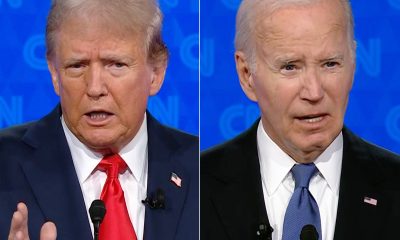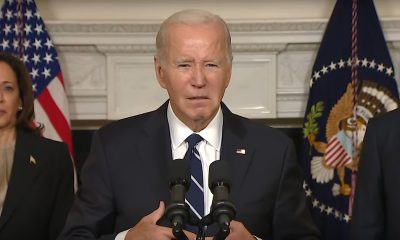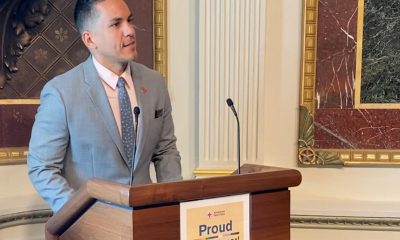National
UPDATED: GLAAD’s communication breakdown; Barrios voted out
Media watchdog group dogged by allegations of dishonesty, incompetence

UPDATE: According to Politico, the Executive committee of GLAAD’s Board of Directors has voted to remove Jarrett Barrios as President of the organization.
UPDATE 2: According to both Michelangelo Signorile and the Bilerico Project, Rich Ferraro is confirming that Jarrett Barrios has stepped down as GLAAD’s President.

A former GLAAD board chair has called for the resignation of its president, Jarrett Barrios. (Photo courtesy GLAAD)
The Gay & Lesbian Alliance Against Defamation raised eyebrows last week when the media watchdog group released a statement supporting the merger of telecom giants AT&T and T-Mobile. It marked the second time the organization, which was founded in 1985 as a grassroots action network, had weighed in on major business news. The prior statement had been released a year earlier objecting to the NBC-Comcast merger, due to concerns about negative portrayals of LGBT characters in the media.
The AT&T statement was curious, but attracted little media attention.
That changed on Tuesday, when former GLAAD board of directors co-chair Laurie Perper appeared on Michelangelo Signorile’s Sirius-XM OutQ show to sound the alarm on other alleged improprieties at the organization and questions facing its leader, Jarrett Barrios.
Since then, Barrios — who has been at the helm of GLAAD for 23 months — has granted a flurry of interviews to counter Perper’s claims. His responses, however, have only served to attract more scrutiny of the organization.
While speaking with Perper, Signorile pressed about why she left her position as board chair early. “You stepped down because you just thought he was not qualified. Obviously, as the months went on, others agreed with that assessment,” Signorile summarized. “I believe that over 14 board members have left, [since Barrios took over],” Perper relayed to the radio host.
Signorile continued, “Is it fair to say that most of these people stepped down because of the direction the organization was going, because of Jarrett Barrios?”
“Absolutely,” Perper said.
Reached by phone last week along with GLAAD director of communications Richard Ferraro and GLAAD board member and Florida PR consultant Gary Bitner, Barrios insisted that his short time working with Perper — only five weeks — was marked by a positive working relationship, and was focused on solving the organization’s financial problems.
“It’s perplexing and disappointing, considering that she worked for many years to help build this organization, but this happens sometimes,” Barrios told the Blade. “We form in our movement a circular firing squad, and we for whatever reason feel it’s necessary to hurt somebody else in the movement. [Laurie Perper and I] worked well together. Frankly the time we interacted was the time I was getting my feet wet, learning that the org at the time was running a rather large deficit.”
After booking Perper on the Signorile show, the producers reached out and arranged to have Barrios on the following day to respond to the statements that had been made. However, when GLAAD later attempted to arrange to have Bitner join him on the Signorile show, the show’s producers refused and the GLAAD team pulled out of the arrangement, opting to contact other media outlets and bloggers instead.
Barrios insists that the financial figures that Perper presented on the Signorile show were inaccurate and misleading, including a quote about a $14 million discrepancy after 2008, which Barrios says is the result of an IRS reporting requirement of a major multi-million dollar bequest by the late Ric Weiland of Microsoft that was dispersed over seven years. GLAAD insists that it has righted its financial footing thanks to cuts made early in Barrios’ term, though Ferraro also disputes Perper’s claim that six senior staff members left the organization since Jarrett’s start. GLAAD insists it was only three, with another just having left a few months ago.
“In 2009, there was a substantial deficit — I think it was like $1.2 million,” Barrios said. “Last year, we cut the operating deficit to $300,000 — shrunk it by about $900,000 — and this year, I’m happy to say, we’re running ahead of budget … most notably, our national presenting sponsor has already renewed for next year. That typically doesn’t happen until January. It’s already happened for next year. We’re very pleased. Our corporate revenues this year are substantially higher than last year, which were higher than the year before.”
Perper’s main purpose for appearing on Signorile’s show, however, was to question the reasoning behind GLAAD’s unexpected statement voicing support for the AT&T/T-Mobile merger. GLAAD joined unions, advocacy organizations and other LGBT-specific organizations like the National Gay and Lesbian Chamber of Commerce and Out At Work in supporting the merger. These three organizations joined the NAACP, and the National Education Association in pushing the FCC for the merger.
Perper points to this as evidence that AT&T may have “bought influence with these” non-profits to advocate for the merger with the FCC.
Hours after his conversation with the Blade, Barrios appeared on Chicago’s “Feast of Fun” podcast with Marc Felion and Fausto Fernos. The issue of GLAAD’s curious support of the AT&T/T-Mobile merger and Perper’s statements regarding that merger soon came up, and Barrios seemed to change his story on a long-forgotten episode from more than a year ago when GLAAD released two letters regarding the principles of “net-neutrality” and expressed support for expanding Internet access. The second letter was later retracted.
At the time, Barrios wrote the FCC asking the letter to be removed from the public record, stating that he’d not given his permission for the letter to be submitted and that the signature is “not in my hand.” However, while speaking with “Feast of Fun,” his story seemed to change.
“It was like January of 2010. And it, it sort of supported the telecom industry’s position on net neutrality, which was not GLAAD’s position,” Barrios said. “In fact, GLAAD, at the time and still, doesn’t endorse bills and doesn’t endorse regulatory actions. So, it would have been impossible for us to do that.”
When reached by phone last week, Richard Ferraro explained why GLAAD cannot take a position on net neutrality.
“As a 501(c)3 there’s a question about whether or not we can,” Ferraro told the Blade. “It’s obvious where we stand [on universal access] … mergers are different.”
On “Feast of Fun,” Barrios shifted his story about the letter’s submission, after taking the position a year earlier that the organization had no knowledge of the letter prior to its submission.
“After an investigation, we determined that it was an administrative error, internally at GLAAD, and I’ll own that, and we withdrew the letter. At the time we withdrew the letter, we didn’t know that, so I was — you can imagine reading a letter in a public submission with your name on it that you had never seen, and it wasn’t your signature — after we did an internal investigation, we realized it was an internal error, an administrative error.”
“[The letter] was pulled, one, because it’s an anti-net-neutrality letter,” Ferraro clarified for the Blade. “Two, because at that point and currently, GLAAD does not take positions on legislation or regulation.”
In January, when the letter had been submitted and subsequently retracted, the narrative that emerged was that the letter had been forged. However, after the Feast of Fun statements, Bil Browning of Bilerico Project sought a clearer explanation about the letter.
In an interview last week with Browning, Barrios revealed his personal assistant — a woman Bilerico identified as Jeanne Christiano who has worked for Barrios consistently for seven years, and goes back to his days as a Massachusetts state senator — had called him while he was on the road, and in a hurry, he gave the letter his approval thinking that the two were discussing the previous letter with language Barrios had approved.
“We made a mistake. I authorized my assistant over the phone to sign and submit a letter that I understood to be a re-filing of the October letter in support of broadband proliferation,” Barrios told Browning. “When I realized she had inadvertently submitted an anti-net neutrality letter, I withdrew it … at the time, I had never seen the letter that was filed, and did not recognize the signature.”
Last week, after the story broke of the retracted letter to the FCC supporting the telecom’s position on net-neutrality, the Blade again spoke with Ferraro, this time about the new information emerging about the FCC letter.
“There’s an October letter that Jarrett wrote to the FCC that’s on the FCC site,” Ferraro told the Blade, “that very broadly talks about broadband proliferation, and speaks to our statement Friday about net-neutrality, which is that we don’t currently have a position, but we support universal access … we support the ideas behind, the principles behind net-neutrality – that we can do.”
According to Ferraro, GLAAD board member and communications law professor at American University, Anthony Varona, noticed the subtle pro-telecom messages in the letter after having served as a lawyer at the FCC in the past and immediately contacted the organization’s leadership asking why GLAAD was supporting the telecom industry’s anti-net-neutrality stance.
“When Tony Verona — who speaks FCC language — read this,” Ferraro explained, “he said ‘Why the heck did you send in a letter anti-net-neutrality?’ Jarrett of course said, ‘I never read that letter, I never said I’m against net-neutrality.’”
According to Ferraro, the suggested language is believed to have come directly from AT&T, and was copied verbatim by Barrios’ assistant, Jeanne Christiano.
Ferraro explained, “He was traveling, as he still does [a lot] … she’s more than an assistant — they’ve worked together for seven years. … I was not on the call, so can’t speak with certainty, but he said she called him and said something along the lines of ‘so I have the letter on broadband. They want the letter, do you want me to go forward with it?’ and he said, ‘yeah yeah,’ thinking it was the October letter.”
Ferraro agreed there must have been a major communication breakdown at GLAAD.
“He never saw the letter, and he said, ‘yeah, send it in.’ And obviously he didn’t mean to send it in, because as soon as the board member [questioned the letter], he said, ‘huh? I never saw that letter. I didn’t sign that letter. That’s not my signature.’ and he didn’t authorize it. The thing that he’s been trying to do is he doesn’t want to throw her under the bus. This was his mistake. He should have read the letter — he didn’t.”
The controversy raises the question: will GLAAD start weighting in on other FCC-related matters if a business has any ties to the LGBT community?
“One thing that has happened since Jarrett came on board, is that we’ve been more engaged with the FCC, which is a government agency that needs to hear more from the LGBT community … since then, you did hear us weigh in on the NBC merger, you did hear us weigh in on AT&T and we did file an FCC complaint about ‘Jose Luis Sin Censura,’ which is the most anti-gay program on television today,” Ferraro said.
Some activists argue there are larger issues at play than GLAAD’s support of the AT&T merger, or whether or not GLAAD can take a position on net-neutrality. Some leaders in the community are wondering if GLAAD is ready to unravel. Laurie Perper herself called for the dissolution of GLAAD, and discussed it with Signorile when she appeared on his show.
When the Blade asked Perper if GLAAD could survive this controversy, she said it would require a massive change in personnel and makeup of the board.
“One of the things that has come forward is GLAAD’s brand name has been heavily tied to the media awards and people feel that GLAAD is owned by the broadcasters,” Perper said. “The word transparency gets thrown around a lot and unfortunately I found in trying to manage Jarrett that he was far from transparent. So I was actually there for five months with him, and that was long enough for me to see that he was going to make decisions against the board, without consulting the board, the co-chairs and against their will.”
Perper also believes a narrower focus would help GLAAD recover.
“I think that they’ve expanded their programmatic work too much and therefore don’t have a solid impact in any one area, so I think they need to retract a little bit in this difficult economy, decide where they want to make an impact, and truly come out with thoughtful statements, rather than the flip-flopping I’ve seen them do with Adam Lambert, with the AT&T situation. … So they just need a consistent message and vision that they can put forth, that people can understand, and then they need to act on it as hard as they can.”
She continued, “I’ve had a lot of discussions with people who happen to be aware of a lot of the situation that’s going on with GLAAD and a lot of the controversy,” she continued, “and they all feel very strongly about the GLAAD brand name and that it still has tremendous value in the marketplace. So when I talk about the dissolution of it, I do it with a really heavy heart, not ‘how do you ever rebuild a brand name like that,’ but thinking ‘how do you get rid of a president and half of the board members who have helped enable him to bring such tarnish to the name?’”
Barrios, however, sees the organization heading in the right direction.
“We’ve enjoyed some of our highest profile victories ever in the last 18 months,” said Barrios. “So where we’re going is down that path … we’ve had some major victories with the ‘Today’ show, the marriage contest last year. A number of victories with our ‘no two sides’ campaign last year … Mostly that work is happening behind the scenes.”
When members of the media continued to pursue answers to the questions left unanswered at the onset of last weekend, GLAAD tried to shift attention to the Tracy Morgan scandal on Friday. GLAAD backed off from a promise to have Barrios chat on the phone with the Blade in regard to the new confusion brought about by the Friday morning Bilerico report and the Thursday morning Feast of Fun interview.
What’s still unclear is how the suggested language ended up in an official letter on GLAAD letterhead. GLAAD would not comment on whom from AT&T delivered the suggested language, noting only that “AT&T is the source.” However, with a former AT&T lobbyist on the board of directors, who now consults for telecom companies including AT&T, some wonder if Troupe Coronado was the conduit for this “suggested language” that turned GLAAD into an anti-net-neutrality advocate for the telecom industry.
Also unanswered is how unauthorized language was allowed to be submitted by an assistant to a government agency. If this specific language was not approved, why was there no protocol in place to prevent a scenario where an employee of the organization can sign the president’s name to an official document and send it as an agent of the entire group?
There are also nagging questions about Troupe Coronado’s influence and role in the controversy. In January 2006, the Washington Post’s Jeffrey H. Birnbaum and Thomas B. Edsall investigated Coronado for allegedly exceeding the gift-giving limits on lobbyists when schmoozing lawmakers. He was still with BellSouth at the time. BellSouth is now part of AT&T. In addition, OpenSecrets.org lists him as a “revolving door personnel,” someone who has bounced from industry lobbying jobs, to government jobs and back again.
Coronado’s connections to the telecom industry and GLAAD’s subsequent misfires in the field of telecom regulation and corporate dealings is troubling for many activists, even if those connections are tenuous and possibly only coincidental.
U.S. Supreme Court
Concern over marriage equality in US grows two decades after first Mass. same-sex weddings
Gay and lesbian couples began to marry in Bay State in 2004

Two decades after Massachusetts became the first state to legalize same-sex marriage, a new study reveals both significant progress and ongoing challenges for married LGBTQ couples in the U.S., with a growing sense of insecurity about the future of their rights.
The Williams Institute at UCLA School of Law surveyed 484 married same-sex couples from all 50 states and D.C. The study, released Monday, marks the 20th anniversary of legal same-sex marriage in the U.S.
Researchers found that 93 percent of respondents cited love as a primary reason for marrying, with 75 percent also mentioning legal protections. Over 83 percent reported positive changes in their sense of security, and 74.6 percent noted improved life satisfaction since marrying.
However, the study also highlighted persistent discrimination and growing concerns about the future. About 11 percent of couples who had a wedding reported facing prejudice during the planning process.
Alarmingly, nearly 80 percent of respondents expressed concern about the potential overturning of the 2015 Obergefell v. Hodges decision, which legalized same-sex marriage nationwide. This anxiety has been exacerbated by initiatives like Project 2025, a conservative policy blueprint that some fear could roll back LGBTQ rights if implemented.
The possibility of a former President Donald Trump victory in the upcoming election has further intensified these concerns. Many respondents cited Trump’s previous U.S. Supreme Court appointments and his statements on LGBTQ issues as reasons for their apprehension. One participant stated, “The thought of another Trump presidency keeps me up at night. We’ve come so far, but it feels like our rights could be stripped away at any moment.”
The current political climate has 29 percent of respondents considering moving to another state, with 52.9 percent citing socio-political concerns as a primary reason. This reflects a growing sense of insecurity among LGBTQ couples about their rights and freedoms.
Brad Sears, founding executive director of the Williams Institute, noted, “The data clearly show that marriage equality has had a profound positive impact on same-sex couples and their families. However, it also reveals ongoing challenges and serious concerns about the future of these rights in light of current political trends and the upcoming election.”
Christy Mallory, legal director at the Williams Institute and lead author of the study, added, “This research provides crucial insights into the lived experiences of same-sex couples two decades after marriage equality began in the U.S. The high level of concern about potential loss of rights underscores the continued importance of legal protections and public support for LGBTQ+ equality.”
The study found that 30 percent of surveyed couples have children, with 58.1 percent of those parents reporting that marriage provided more stability for their families. However, many of these families now worry about the security of their legal status in the face of potential policy changes and shifting political landscapes.
As the nation reflects on two decades of marriage equality, the study underscores both the transformative power of legal recognition and the ongoing need for vigilance in protecting LGBTQ+ rights. The findings highlight the complex reality faced by same-sex couples in America today: Celebrating hard-won progress while grappling with uncertainty about the future, particularly in light of upcoming political events and potential shifts in leadership.
State Department
State Department hosts meeting on LGBTQ rights and foreign policy
Event took place before Pride Month reception

Secretary of State Antony Blinken on Thursday hosted a group of LGBTQ activists and politicians from around the world at the State Department.
The event — described as a “Convening on U.S. Foreign Policy: National Security, Inclusive Development, and the Human Rights of LGBTQI+ Persons” — took place before the State Department’s annual Pride Month reception. Participants included:
• Jessica Stern, the special U.S. envoy for the promotion of LGBTQ and intersex rights
• U.S. Ambassador to the U.N. Linda Thomas-Greenfield
• U.S. Trade Representative Katherine Tai
• U.S. Ambassador to India Eric Garcetti
• Suzanne Goldberg, senior advisor to the Under Secretary of State for Civil Security, Democracy, and Human Rights
• Under Secretary of State for Civilian Security, Democracy, and Human Rights Uzra Zeya
• U.S. Agency for International Development Senior LGBTQI+ Coordinator Jay Gilliam
• USAID Counselor Clinton D. White
• National Security Council Senior Director for Democracy and Human Rights Kelly Razzouk
• Assistant U.S. Secretary of Health Adm. Rachel Levine
• National Security Council Human Rights Director Jess Huber
• U.N. Assistant Secretary General for Human Rights Ilze Brandt Kehris
• Icelandic Ambassador to the U.S. Bergdís Ellertsdóttir
• Council for Global Equality Co-Executive Director Mark Bromley
• Outright International Senior Advisor for Global Intersex Rights Kimberly Zieselman
• Essy Adhiambo, executive director of the Institute for Equality and Non Discrimination in Kenya
• Pau González, co-chair of Hombres Trans Panamá and PFLAG-Panamá
“Forty-five years ago, thousands gathered in D.C. in what became the first national march for LGBTQI+, demanding their voices be heard,” said Thomas-Greenfield in a post to her X account that showed her speaking at the event. “We must continue to carry forward the spirit of these pioneers and fight for equal rights and dignity for all.”
Forty-five years ago, thousands gathered in DC in what became the first national march for LGBTQI+, demanding their voices be heard.
We must continue to carry forward the spirit of these pioneers and fight for equal rights and dignity for all. 🏳️🌈🏳️⚧️ pic.twitter.com/oph2Ahmfhq
— Ambassador Linda Thomas-Greenfield (@USAmbUN) June 28, 2024
President Joe Biden in 2021 signed a memo that committed the U.S. to promoting LGBTQ and intersex rights abroad as part of his administration’s overall foreign policy.
“LGBTQI+ rights are human rights,” said Blinken. “Our government has a responsibility to defend them, to promote them — here and everywhere.”
Blinken noted consensual same-sex sexual relations remain criminalized in 64 countries, with the death penalty in 11 of them.
He specifically highlighted Uganda’s Anti-Homosexuality Act and Hungarian Prime Minister Viktor Orbán’s government’s “smearing scapegoating, stigmatizing LGBTQI+ persons — vilifying them with degrading labels, denying them equal rights, normalizing violence against them.” (Gay U.S. Ambassador to Hungary David Pressman this month marched in the annual Budapest Pride parade.)
Blinken noted Iraqi MPs earlier this year “passed legislation that punishes same-sex relations with up to 15 years in prison.” He also pointed out that Indonesian lawmakers approved a new criminal code banning extramarital sex.
“In a nation where same-sex couples cannot marry, these laws effectively make all same-sex conduct illegal and they undermine privacy for all Indonesians,” said Blinken.
“We’re defending and promoting LGBTQI+ rights around the world,” he said.
Blinken noted seven countries — Barbados, St. Kitts and Nevis, Antigua and Barbuda, Dominica, Namibia, Singapore, the Cook Islands — have decriminalized consensual same-sex sexual relations over the last two years. He also highlighted Greece, Liechtenstein, and Thailand this year extended marriage rights to same-sex couples, and other countries are banning so-called “conversion therapy.”
“These achievements are possible because of incredibly courageous human rights defenders and government partners on the ground, but I believe America’s support is indispensable,” said Blinken. “When we engage — sometimes publicly, sometimes privately, sometimes both — when we share our own knowledge and experience, we can and we do achieve change.”
Blinken also announced the U.S. now considers sexual orientation and gender identity are part of the International Covenant on Civil and Political Rights that took effect in 1976.
“This is one of the key treaties committing nations to upholding universal rights,” he said.
“In our regular reporting to the council on human rights, we will continue to include incidents of discrimination or abuse committed against LGBTQI+ persons, now with the clear framework of this well-supported interpretation,” added Blinken. “That will further empower our efforts.”
Blinken reiterated this point and the Biden-Harris administration’s commitment to the promotion of LGBTQ and intersex rights abroad when he spoke at the State Department’s Pride Month event.
“Defending, promoting LGBTQI+ rights globally is the right thing to do, but beyond that, it’s the smart and necessary thing to do for our country, for our national security, for our well-being,” he said.
The White House
Jill and Ashley Biden headline White House Pride celebration
First lady celebrated historic pardons of LGBTQ veterans

First lady Jill Biden and the president and first lady’s daughter, Ashley Biden, headlined the White House Pride celebration on the South Lawn on Wednesday, followed by a performance by singer and actress Deborah Cox.
“My dad has built the most pro-equality administration” in history, Ashley Biden said, crediting the work of LGBTQ people of color like Marsha P. Johnson, a prominent figure in the Stonewall uprising of 1969, as well as “so many of you [who] have continued to lead their fearless fighting against against injustice here and around the world.”
She introduced her mother as “the woman who taught me to be myself up showed me in so many ways how I can make a difference” and who “works every single day, tirelessly, to ensure that all people have the opportunities and freedoms that they deserve.”
“I hope that all of you feel that freedom and love on the South Lawn today,” Jill Biden said.
Her remarks were briefly interrupted by a protestor’s chants of “no Pride in genocide,” which was drowned out by chants of “four more years.”
The first lady noted how many of the attendees came “here from states that are passing laws targeting LGBTQ Americans.”
“There are those who see our communities and our families and wish to tear them down,” she said, “those who can’t see that the world is so much bigger and [more] beautiful than they know — but when our homes are threatened, when they strip away our rights, and deny our basic humanity, we say, ‘not on our watch.'”
“Pride is a celebration, but it is also a declaration,” the first lady said, highlighting the U.S. Supreme Court’s ruling in Obergefell v. Hodges nine years ago, which established marriage equality as the law of the land.
She then credited the accomplishments of the Biden-Harris administration on matters of LGBTQ rights, including the repeal of the previous administration’s ban on military service by transgender servicemembers and the FDA’s loosening of restrictions on blood donation by gay and bisexual men.
The first lady also celebrated the president’s announcement earlier on Wednesday that he will pardon LGBTQ veterans who were discharged and court martialed because of their sexual orientation or gender identity.
“We will never stop fighting for this community,” she said.

-

 Canada1 day ago
Canada1 day agoToronto Pride parade cancelled after pro-Palestinian protesters disrupt it
-

 Theater5 days ago
Theater5 days agoStephen Mark Lukas makes sublime turn in ‘Funny Girl’
-

 Baltimore4 days ago
Baltimore4 days agoDespite record crowds, Baltimore Pride’s LGBTQ critics say organizers dropped the ball
-

 Sports4 days ago
Sports4 days agoHaters troll official Olympics Instagram for celebrating gay athlete and boyfriend











